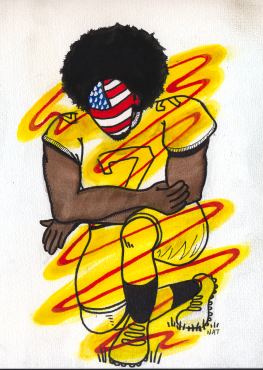It was last December at the United Center on the west side of Chicago that I witnessed the impact politics has on sport.

Graphic by Nat Inez, Graphics Contributor
“Ladies and gentlemen, please rise and remove your caps,” said the public address announcer, and, as I have done at countless sports events, I rose to my feet.
The capacity crowd, dressed in cardinal red waiting to cheer on the hometown Chicago Bulls, stood for the U.S. national anthem.
Well, almost everyone.
I looked around, and noticed an African-American man sitting in his seat. I had never seen someone fail to rise for the anthem at any of the hundreds of sporting events I have attended. But I noticed he was not the only one — three other men remained in their seats as “The Star Spangled Banner” roared on.
Stop me if you have heard this before — in the wake of U.S. President Donald Trump’s recent controversial comments, I find myself saluting the men who refuse to stand for the anthem.
On Sept. 22, Trump was quoted saying, “wouldn’t you love to see one of these NFL (National Football League) owners, when someone disrespects our flag to say, ‘Get that son of a bitch off the field right now.’ Out! He’s fired! He’s fired!”
The sports world reacted furiously, as it should. On Sept. 24, the first NFL Sunday after Trump’s nasty rhetoric, a few NFL owners locked arms with their players on the field during the anthem; a record number of players have since taken a knee during the anthem; the first Major League Baseball player kneeled; and three NFL teams decided to stay in their locker room, refusing to be on the field during the anthem singing.
The protests of kneeling for the anthem can be traced to Colin Kaepernick, a former San Francisco 49ers quarterback, who first decided against standing for the anthem in August of 2016 in the wake of police officers shooting unarmed African-Americans.
“I am not going to stand up and show pride in a flag for a country that oppresses black people and people of colour,” said Kaepernick back in 2016.
Kaepernick opted out of his contract this March, and has yet to be signed by any NFL team.
Trump even mocked how the owners were scared of signing the polarizing Kaepernick.
“There was an article today,” he leered, “it was reported that, NFL owners don’t want to pick him [Kaepernick] up because they don’t want to get a nasty tweet from Donald Trump.”
The situation has evolved, and those who refuse to stand for the anthem now are doing so in defiance of Trump.
The unity and protest against unrest in the United States has recently spread north of the border to the Canadian Football League. On Sept. 24, the Saskatchewan Roughriders locked arms during the singing of “O Canada,”showing support for their fellow athletes down south.
Bo Levi Mitchell, an American quarterback for the Calgary Stampeders voiced his frustration after the game.
“It’s sad and disheartening to me as an American to see our president getting in bickering matches with people on Twitter, calling out athletes, saying they should be fired.”
It should be noted that sports athletes do not have to voice their opinions — it’s not their responsibility to take time away from the sport they play and protest political issues.
But the athletes know that children look up to them as role models, and defying Trump’s hate speech shows their audience the difference between unity and apathy.
To Colin Kaepernick, and all athletes that use your platform to voice your opinions, I applaud and kneel with you in this time of political unrest.






